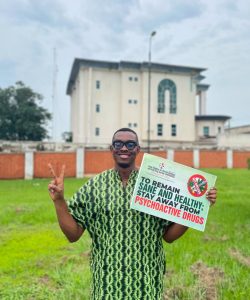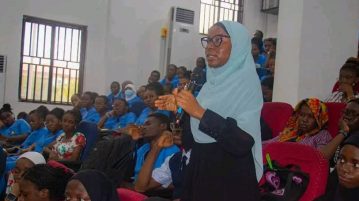Residency training is an important part of the medical career pathway…
Still on the trail of speaking with resident doctors in Nigeria, towards providing insights into the current state of residency for other colleagues and dispelling misconceptions surrounding this pathway, we interviewed Dr. Igbor Clement, a psychiatry resident based in Ekiti State.
Interviewers: Mary O. A. Awoniyi & Ire Adeleye
MM: Thank you for having us. Can you share how you got into residency with us?
Dr. Igbor Clement: Oh yes. I served in the department of psychiatry at Ekiti State University Teaching Hospital (EKSUTH), Ado-Ekiti as a Corps member from April 2023 till March 2024, and subsequently continued as a resident after service.
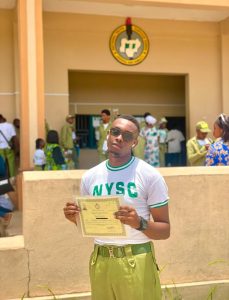
MM: Interesting. So, what motivated you to continue into the Psychiatry residency program?
Dr. Igbor Clement: To be honest, at that point, I was in a career limbo. I was about 4 years post-graduation; I had spent my initial post-graduation years reviving my creative career, and was just about to start my youth service, with no japa plans in motion at all. During that period, I had worked several odd jobs as a medical officer, but the one I really loved was working as a medical officer in a private psychiatric hospital and rehabilitation centre. Also, because I had lived experience with some personal mental health struggles myself, I became very passionate about mental health and always wanted to help others navigate such challenges. So, it was always really psychiatry. Plus, being a writer and poet, psychiatry was the best fit for my creative and communication skills.
MM: Wow, that’s a lot to unpack. Now, since commencing your training in psychiatry, what have been the highlights of your experience so far? and what’s been the most rewarding part of your experience so far?
Dr. Igbor Clement: I don’t think I have any major memorable highlights yet. My field is interesting with lots of drama from patients, members of staff, other doctors etc but nothing really stands out yet. I like the bosses I train under, my fellow residents and other coworkers. Compared to what I saw as an undergraduate and earlier in my career, the toxicity surrounding the job is relatively very low. Also, delving deeper into the specialty and medicine in general, the knowledge and experience being gained can be very rewarding.
I’m learning a lot about psychiatry, medicine and life itself.
MM: There are so many hear-says about residency in Nigeria generally, what are some common misconceptions that you’ve encountered, and how do you wish people could better understand the experience?
Dr. Igbor Clement: I feel most of those experiences are valid for the most part. Centers, bosses and experiences differ significantly. Generally, it is difficult, time consuming and can be filled with a lot of toxicities, but good centers and understanding colleagues make it easier, and you also get used to it. I heard exams are hard too, but I’ve not yet experienced the harder ones.
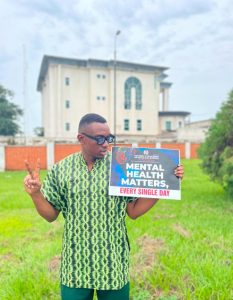
MM: What are some of the current challenges encountered during residency training, and how do you think these can be managed by residents?
Dr. Igbor Clement: In general, I don’t think we are enough. There are very few doctors in the country and even fewer in training. So, every center and department is grossly understaffed, and the workload enormously more for those available. The solution is more systemic; the pay is relatively poor, making it unattractive to most doctors. Hence, making it more rewarding will attract a lot more people. Also, exams are very expensive. Some centers pay a training bonus for exams, but there’s a lot of bottlenecks and delays in getting it. Even if you do, it barely covers for the entire fees involved. Residents just have to tighten up a lot financially and cut costs which is not easy in this economy.
MM: How do you balance the demands of residency training with personal life and what self-care practices do you prioritize?
Dr. Igbor Clement: Do I even balance these days? I’m training in a city different from where I grew up, so I’m doing fewer extracurricular activities than I used to. Nonetheless, I go to the gym when the spirit leads, used to hike a lot (but reduced now) and I hang out with friends quite often. I prioritize my alone time in my house pressing my phone or sleeping. I’m single unluckily, so luckily there’s no family life to balance. I’m also involved in the association’s leadership in my center, as I am the current PRO, Association of Resident Doctors (ARD), EKSUTH.
MM: How do you see the future of specialty training in Nigeria evolving, and in what way can young doctors be well positioned for it?
Dr. Igbor Clement: It’s becoming an option. Migration is becoming difficult financially and there are fewer jobs abroad, so a lot of people are considering training. The best bet for most people is to have something here that ensures career growth, while trying to leave – if you want to. It’s not really hard to get in now, just try to sit any of the primary examinations and look out for centers recruiting.
I advise being sure of your specialty interests first, because a little passion helps.
MM: On a scale of 1-10, rate your own residency experience.
Dr. Igbor Clement: Well, 6/10 mostly, because of the vibes.
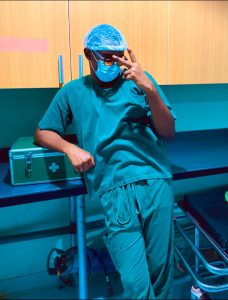
MM: If you could go back in time, would you still make the same decision in terms of specialty and training centre?
Dr. Igbor Clement: Most likely. I miss my home city a lot, so I might choose a center there, where I can still combine residency with my creative and media work. But then, it’s a very expensive city and residency money might not be enough to survive there.
MM: Finally, what advice would you give to colleagues just starting their training and potential applicants contemplating the residency program?
Dr. Igbor Clement: For colleagues starting out: Do good research about your training center, be sure about things like net pay, timely wages, residency bonuses, costs of living, welfare and treatment of doctors by superiors there. Commit to it, be prepared to learn and be mentored, learn to endure the tough calls and try to map out a growth plan for yourself.
For colleagues still unsure about pursuing the program: If it’s your best bet at the moment, please do it! If you’re aiming to become a specialist, get into the program and start chasing it. The experience and training will also count anywhere you eventually end up.
MM: Thank you for sharing your story and experience with us.
